Unit 2 Exploring English Using language 课件(共21张PPT)-2025-2026学年外研版(2019)必修第一册
文档属性
| 名称 | Unit 2 Exploring English Using language 课件(共21张PPT)-2025-2026学年外研版(2019)必修第一册 | 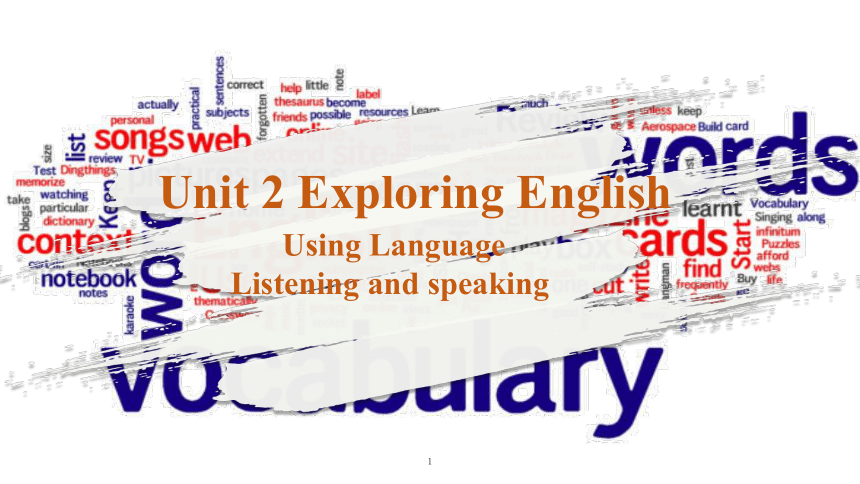 | |
| 格式 | pptx | ||
| 文件大小 | 10.0MB | ||
| 资源类型 | 教案 | ||
| 版本资源 | 外研版(2019) | ||
| 科目 | 英语 | ||
| 更新时间 | 2025-07-17 10:11:28 | ||
图片预览

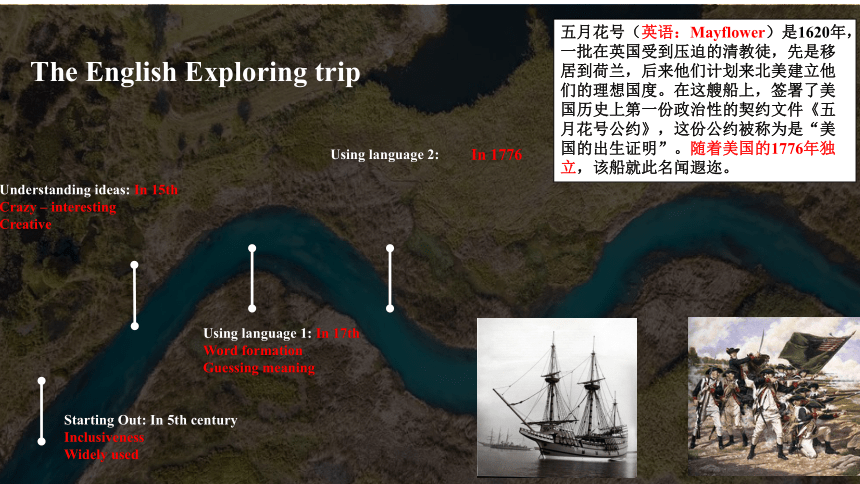
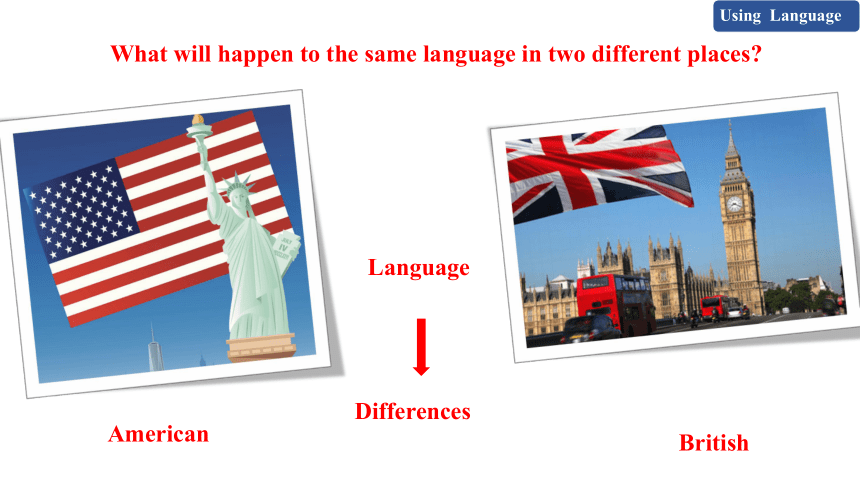
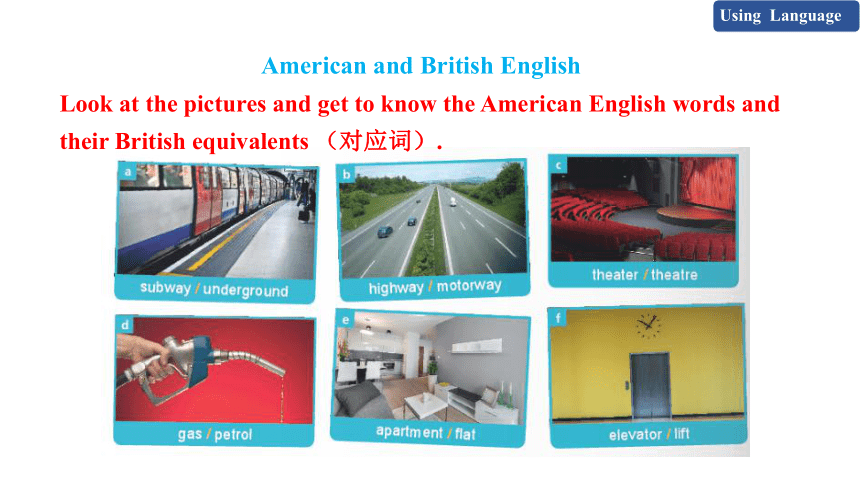
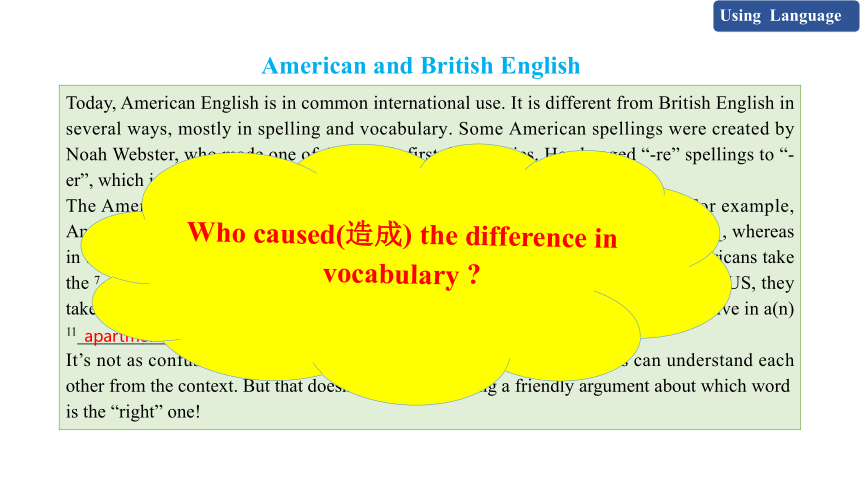
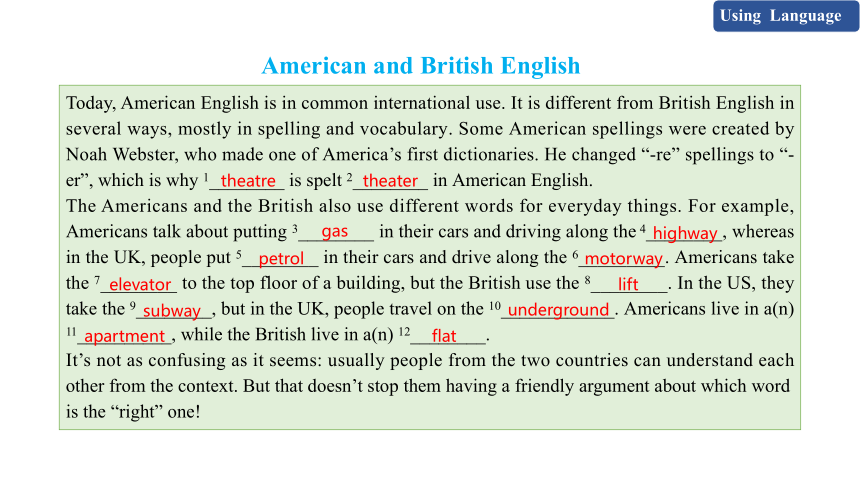
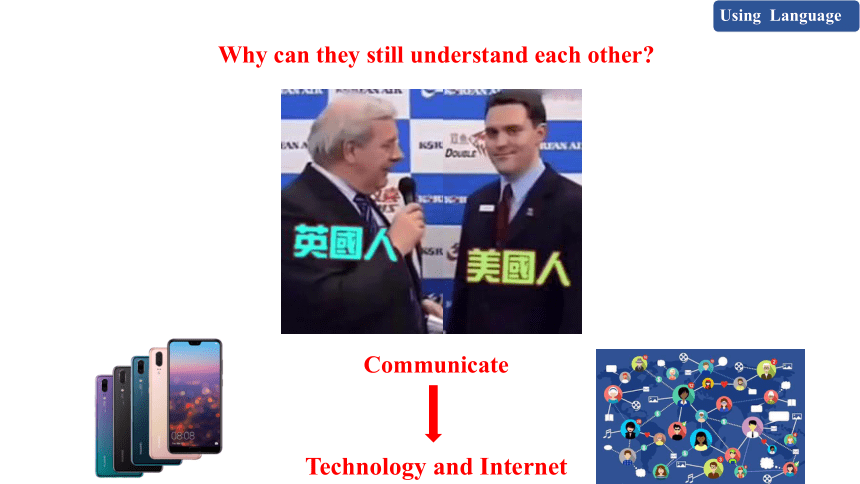
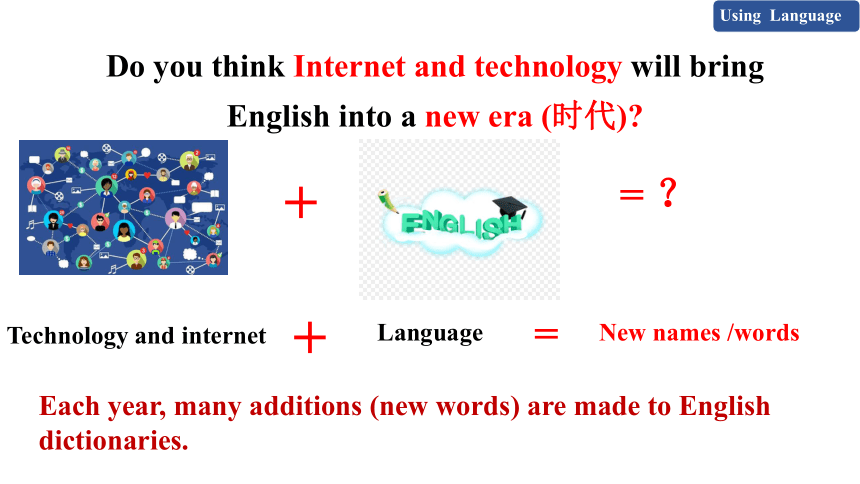
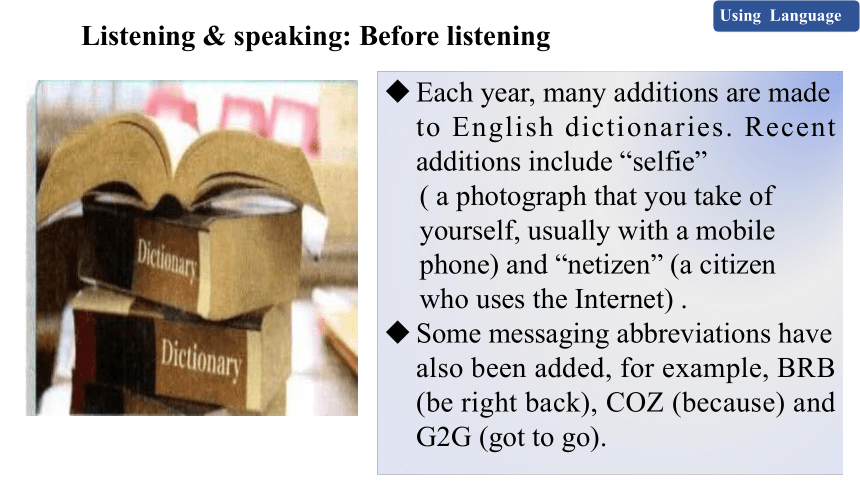
文档简介
(共21张PPT)
Unit 2 Exploring English
Using Language
Listening and speaking
The English Exploring trip
Starting Out: In 5th century
Inclusiveness
Widely used
Understanding ideas: In 15th
Crazy – interesting
Creative
Using language 1: In 17th
Word formation
Guessing meaning
Using language 2:
In 1776
五月花号(英语:Mayflower)是1620年,一批在英国受到压迫的清教徒,先是移居到荷兰,后来他们计划来北美建立他们的理想国度。在这艘船上,签署了美国历史上第一份政治性的契约文件《五月花号公约》,这份公约被称为是“美国的出生证明”。随着美国的1776年独立,该船就此名闻遐迩。
What will happen to the same language in two different places
Language
American
British
Differences
Using Language
American and British English
Look at the pictures and get to know the American English words and their British equivalents (对应词).
Using Language
American and British English
Today, American English is in common international use. It is different from British English in several ways, mostly in spelling and vocabulary. Some American spellings were created by Noah Webster, who made one of America’s first dictionaries. He changed “-re” spellings to “-er”, which is why 1________ is spelt 2________ in American English.
The Americans and the British also use different words for everyday things. For example, Americans talk about putting 3________ in their cars and driving along the 4________, whereas in the UK, people put 5________ in their cars and drive along the 6_________. Americans take the 7________ to the top floor of a building, but the British use the 8________. In the US, they take the 9________, but in the UK, people travel on the 10____________. Americans live in a(n) 11__________, while the British live in a(n) 12________.
It’s not as confusing as it seems: usually people from the two countries can understand each other from the context. But that doesn’t stop them having a friendly argument about which word is the “right” one!
theatre
theater
gas
highway
petrol
motorway
elevator
lift
subway
underground
apartment
flat
Who caused(造成) the difference in vocabulary
Using Language
American and British English
Today, American English is in common international use. It is different from British English in several ways, mostly in spelling and vocabulary. Some American spellings were created by Noah Webster, who made one of America’s first dictionaries. He changed “-re” spellings to “-er”, which is why 1________ is spelt 2________ in American English.
The Americans and the British also use different words for everyday things. For example, Americans talk about putting 3________ in their cars and driving along the 4________, whereas in the UK, people put 5________ in their cars and drive along the 6_________. Americans take the 7________ to the top floor of a building, but the British use the 8________. In the US, they take the 9________, but in the UK, people travel on the 10____________. Americans live in a(n) 11__________, while the British live in a(n) 12________.
It’s not as confusing as it seems: usually people from the two countries can understand each other from the context. But that doesn’t stop them having a friendly argument about which word is the “right” one!
theatre
theater
gas
highway
petrol
motorway
elevator
lift
subway
underground
apartment
flat
Using Language
Why can they still understand each other
Communicate
Technology and Internet
Using Language
Do you think Internet and technology will bring English into a new era (时代)
Technology and internet
+
= ?
Language
+
New names /words
=
Each year, many additions (new words) are made to English dictionaries.
Using Language
Listening & speaking: Before listening
Each year, many additions are made to English dictionaries. Recent additions include “selfie”
( a photograph that you take of
yourself, usually with a mobile
phone) and “netizen” (a citizen
who uses the Internet) .
Some messaging abbreviations have also been added, for example, BRB (be right back), COZ (because) and G2G (got to go).
Using Language
Foreign words
(外来词)
New compound words
(新合成词)
New abbreviation
(新缩写词)
Kungfu
Dim sum
Coffee
Internet +citizen= netizen
Cellphone+ selfish=
BTW:
CUL:
LOL:
THX:
By the way
See you later
Thanks
Using Language
Unfamiliar English expressions
Listen to three conversations and match them to the pictures.
b—Conversation 1
c—Conversation 2
a—Conversation 3
Unfamiliar English expressions
Listen again and complete the table.
Words Meaning Origin
dim sum a kind of traditional 1_____________ from 2_____________________
3__________ using a cellphone without caring about others a combination of the words 4__________ and 5_________
6__________ a shorter way of saying 7___________________ from the Internet
Chinese food
the Guangdong dialect
cellfish
cellphone
selfish
LOL
“laugh out loud”
Using Language
How do the speakers ask for(询问) and explain(解释) the meanings of the words
(Underline(画线) the sentences they use )
Listen again if necessary.
Using Language
Conversation 1
A: I'm going to buy something to eat from the restaurant downstairs.
Would you like anything
B: Oh yes, please. Could you order me some dim sum
A: Some what
B: Dim sum.
A: What kind of food is that
B: It's a kind of traditional Chinese food from South China,
including dumplings, spring rolls, meatballs and so on.
A: Oh, I see. So “dim sum” comes from Chinese
B: Yes, that's right. In fact, it comes from the Guangdong dialect.
In Mandarin or Putonghua it would be “dian xin”.
A: Well, it sounds good! Maybe I'll order that as well…
Using Language
Conversation 2
A: How was the movie
B: It was great, but someone in front of me was talking so loudly on her phone.
A: How cellfish!
B: Yes, I agree. Very selfish.
A: Ah, do you know what I mean by “cellfish”
B: Of course! When you say “selfish”, you mean only caring about yourself
and not about other people, right
A: That's what “selfish” with an “s” means, but I'm talking about “cellfish”
starting with the letter “c”.
B: I haven't heard that word before. What does it mean
A: It means using a cellphone in a way that shows you don't care about the
other people around you.
B: That's interesting. How do you spell it
A: C-E-L-L-F-I-S-H. It's the words “cellphone” and “selfish” put together.
B: Oh, I see…
Using Language
Conversation 3
[SFX of someone pressing mobile phone keys, followed by a chime indicating a new message]
A: Darling, could you take a look at this message from Lucy
I have no idea what she's talking about…again.
B: What has she said
A: Well, I told her a joke that Bob told me today at the office, and,
as you see, she replied “LOL”. What's that for
B: Oh, LOL! It's a shorter way of saying “laugh out loud”.
A: I've never seen or heard that before. Where does it come from
B: It was first used on the Internet. You use it to show you think
something is very funny.
A: Oh, okay.
B: Keep up with the times, darling!
Using Language
How do the speakers ask for and explain the meanings of the words
Useful expressions:
What kind of food is that It's a kind of…
Do you know what I mean by…
I haven't heard that word before. What does it mean It means…
What's that for It's…
Where does it come from It was first used…
Using Language
The English Exploring trip
Starting Out: In 5th century
Inclusiveness
Widely used
Understanding ideas: In 15th
Crazy – interesting
Creative
Using language 1: In 17th
Word formation
Guessing meaning
Using language 2: In 18th
Regional Differences
keep up with time
Developing ideas:
tips: short videos and popular
StudentA:
You are asking for the bill in a restaurant. The waiter / waitress asks you if you need a doggy bag. You don't know what it is and ask him / her to explain.
StudentB:
You are a waiter / waitress in a restaurant. You ask your customer whether he / she needs a doogy bag.
(Notes: A “doggy bag” is a bag or box in which you
take unfinished food home from a restaurant.)
Act out the conversation to ask for and explain the meanings of the expressions.
Situation 1
□ Useful expressions
StudentA( waiter /waitress)
It means…
You use it to…
Student B (customer )
I beg your pardon
What does … mean
What’s that for
When you say … you mean …, right
Show Time
Homework
Unit 2 Exploring English
Using Language
Listening and speaking
The English Exploring trip
Starting Out: In 5th century
Inclusiveness
Widely used
Understanding ideas: In 15th
Crazy – interesting
Creative
Using language 1: In 17th
Word formation
Guessing meaning
Using language 2:
In 1776
五月花号(英语:Mayflower)是1620年,一批在英国受到压迫的清教徒,先是移居到荷兰,后来他们计划来北美建立他们的理想国度。在这艘船上,签署了美国历史上第一份政治性的契约文件《五月花号公约》,这份公约被称为是“美国的出生证明”。随着美国的1776年独立,该船就此名闻遐迩。
What will happen to the same language in two different places
Language
American
British
Differences
Using Language
American and British English
Look at the pictures and get to know the American English words and their British equivalents (对应词).
Using Language
American and British English
Today, American English is in common international use. It is different from British English in several ways, mostly in spelling and vocabulary. Some American spellings were created by Noah Webster, who made one of America’s first dictionaries. He changed “-re” spellings to “-er”, which is why 1________ is spelt 2________ in American English.
The Americans and the British also use different words for everyday things. For example, Americans talk about putting 3________ in their cars and driving along the 4________, whereas in the UK, people put 5________ in their cars and drive along the 6_________. Americans take the 7________ to the top floor of a building, but the British use the 8________. In the US, they take the 9________, but in the UK, people travel on the 10____________. Americans live in a(n) 11__________, while the British live in a(n) 12________.
It’s not as confusing as it seems: usually people from the two countries can understand each other from the context. But that doesn’t stop them having a friendly argument about which word is the “right” one!
theatre
theater
gas
highway
petrol
motorway
elevator
lift
subway
underground
apartment
flat
Who caused(造成) the difference in vocabulary
Using Language
American and British English
Today, American English is in common international use. It is different from British English in several ways, mostly in spelling and vocabulary. Some American spellings were created by Noah Webster, who made one of America’s first dictionaries. He changed “-re” spellings to “-er”, which is why 1________ is spelt 2________ in American English.
The Americans and the British also use different words for everyday things. For example, Americans talk about putting 3________ in their cars and driving along the 4________, whereas in the UK, people put 5________ in their cars and drive along the 6_________. Americans take the 7________ to the top floor of a building, but the British use the 8________. In the US, they take the 9________, but in the UK, people travel on the 10____________. Americans live in a(n) 11__________, while the British live in a(n) 12________.
It’s not as confusing as it seems: usually people from the two countries can understand each other from the context. But that doesn’t stop them having a friendly argument about which word is the “right” one!
theatre
theater
gas
highway
petrol
motorway
elevator
lift
subway
underground
apartment
flat
Using Language
Why can they still understand each other
Communicate
Technology and Internet
Using Language
Do you think Internet and technology will bring English into a new era (时代)
Technology and internet
+
= ?
Language
+
New names /words
=
Each year, many additions (new words) are made to English dictionaries.
Using Language
Listening & speaking: Before listening
Each year, many additions are made to English dictionaries. Recent additions include “selfie”
( a photograph that you take of
yourself, usually with a mobile
phone) and “netizen” (a citizen
who uses the Internet) .
Some messaging abbreviations have also been added, for example, BRB (be right back), COZ (because) and G2G (got to go).
Using Language
Foreign words
(外来词)
New compound words
(新合成词)
New abbreviation
(新缩写词)
Kungfu
Dim sum
Coffee
Internet +citizen= netizen
Cellphone+ selfish=
BTW:
CUL:
LOL:
THX:
By the way
See you later
Thanks
Using Language
Unfamiliar English expressions
Listen to three conversations and match them to the pictures.
b—Conversation 1
c—Conversation 2
a—Conversation 3
Unfamiliar English expressions
Listen again and complete the table.
Words Meaning Origin
dim sum a kind of traditional 1_____________ from 2_____________________
3__________ using a cellphone without caring about others a combination of the words 4__________ and 5_________
6__________ a shorter way of saying 7___________________ from the Internet
Chinese food
the Guangdong dialect
cellfish
cellphone
selfish
LOL
“laugh out loud”
Using Language
How do the speakers ask for(询问) and explain(解释) the meanings of the words
(Underline(画线) the sentences they use )
Listen again if necessary.
Using Language
Conversation 1
A: I'm going to buy something to eat from the restaurant downstairs.
Would you like anything
B: Oh yes, please. Could you order me some dim sum
A: Some what
B: Dim sum.
A: What kind of food is that
B: It's a kind of traditional Chinese food from South China,
including dumplings, spring rolls, meatballs and so on.
A: Oh, I see. So “dim sum” comes from Chinese
B: Yes, that's right. In fact, it comes from the Guangdong dialect.
In Mandarin or Putonghua it would be “dian xin”.
A: Well, it sounds good! Maybe I'll order that as well…
Using Language
Conversation 2
A: How was the movie
B: It was great, but someone in front of me was talking so loudly on her phone.
A: How cellfish!
B: Yes, I agree. Very selfish.
A: Ah, do you know what I mean by “cellfish”
B: Of course! When you say “selfish”, you mean only caring about yourself
and not about other people, right
A: That's what “selfish” with an “s” means, but I'm talking about “cellfish”
starting with the letter “c”.
B: I haven't heard that word before. What does it mean
A: It means using a cellphone in a way that shows you don't care about the
other people around you.
B: That's interesting. How do you spell it
A: C-E-L-L-F-I-S-H. It's the words “cellphone” and “selfish” put together.
B: Oh, I see…
Using Language
Conversation 3
[SFX of someone pressing mobile phone keys, followed by a chime indicating a new message]
A: Darling, could you take a look at this message from Lucy
I have no idea what she's talking about…again.
B: What has she said
A: Well, I told her a joke that Bob told me today at the office, and,
as you see, she replied “LOL”. What's that for
B: Oh, LOL! It's a shorter way of saying “laugh out loud”.
A: I've never seen or heard that before. Where does it come from
B: It was first used on the Internet. You use it to show you think
something is very funny.
A: Oh, okay.
B: Keep up with the times, darling!
Using Language
How do the speakers ask for and explain the meanings of the words
Useful expressions:
What kind of food is that It's a kind of…
Do you know what I mean by…
I haven't heard that word before. What does it mean It means…
What's that for It's…
Where does it come from It was first used…
Using Language
The English Exploring trip
Starting Out: In 5th century
Inclusiveness
Widely used
Understanding ideas: In 15th
Crazy – interesting
Creative
Using language 1: In 17th
Word formation
Guessing meaning
Using language 2: In 18th
Regional Differences
keep up with time
Developing ideas:
tips: short videos and popular
StudentA:
You are asking for the bill in a restaurant. The waiter / waitress asks you if you need a doggy bag. You don't know what it is and ask him / her to explain.
StudentB:
You are a waiter / waitress in a restaurant. You ask your customer whether he / she needs a doogy bag.
(Notes: A “doggy bag” is a bag or box in which you
take unfinished food home from a restaurant.)
Act out the conversation to ask for and explain the meanings of the expressions.
Situation 1
□ Useful expressions
StudentA( waiter /waitress)
It means…
You use it to…
Student B (customer )
I beg your pardon
What does … mean
What’s that for
When you say … you mean …, right
Show Time
Homework
